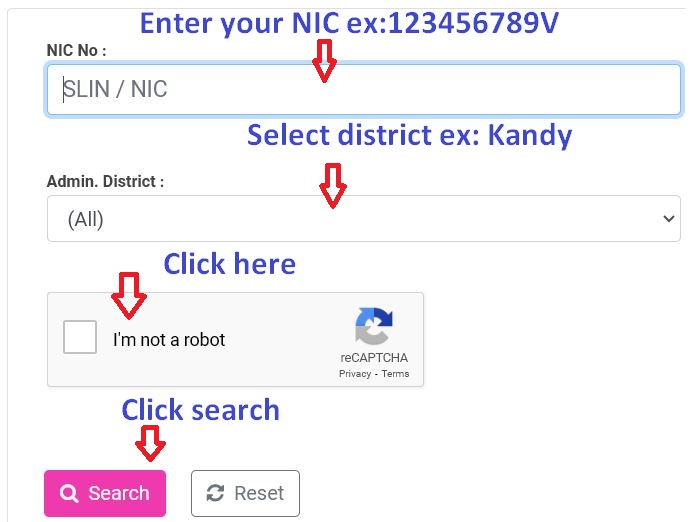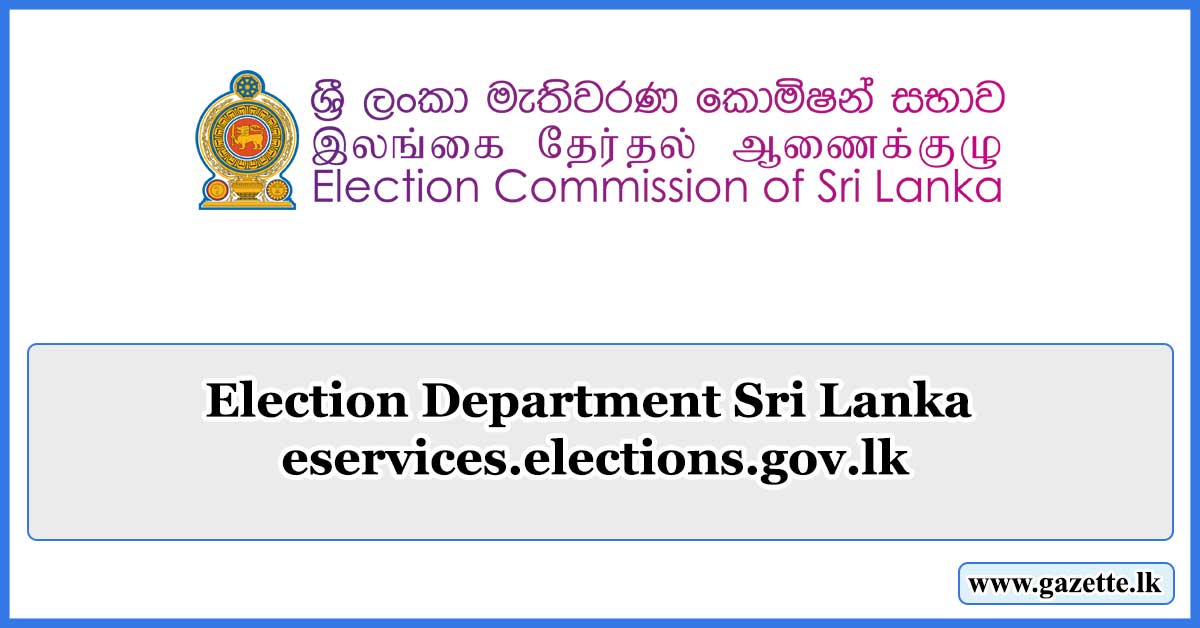The constitutional body in charge of managing and supervising all elections in Sri Lanka, including those for the presidency, legislature, provinces, and local authorities, is the Election Commission of Sri Lanka. Sri Lanka, the oldest democracy in Asia, gained full adult suffrage in 1931, three years after the United Kingdom as a whole. It was the first Crown colony to do so.
Election Department Sri Lanka Contact Details
| Organization | Election Commission of Sri Lanka |
| Address | Election Secretariat, P.O. Box 02, Sarana Mawatha, Rajagiriya, 10107, Sri Lanka |
| Telephone | 0112868441 | 0112868442 | 0112868443 |
| Fax | 0112868426 |
| info@elections.gov.lk | |
| Website | https://elections.gov.lk/indexEn.html# |
| E Services Website | https://eservices.elections.gov.lk/pages/home.aspx |
| Voter Registration Details | Presidential Election 2024 Sri Lanka |
How to search Voter Registration Details Search
Step 01: Go to following link
https://eservices.elections.gov.lk/pages/myVoterRegistrationSearch.aspx
Step 02: Enter your NIC ex:123456789V
Step 02: Select your district
Step 03: Select I’m not a robot
Step 04: Click search

Presidential Election 2024
The presidential election When the Election Commission is mandated by the Constitution to conduct the presidential election, as per the Presidential Elections Act, No. 15 of 1981. (Holding the Presidential Election at a time not to exceed one month or two months prior to the expiration of the President’s term in office, or as a result of the President declaring his desire to hold a Presidential Election.)
Download Acts and Provisions of Act Presidential Election
How does the Election Commission consist?
Regarding Articles 103–104 of Chapter XIV of the Democratic Socialist Constitution of Sri Lanka. Three individuals who have distinguished themselves in any profession, in administration, or in education make up the Election Commission. The President appoints these members based on the Constitutional Council’s proposal. A retired Department of Elections officer who formerly held the position of Deputy Commissioner of Elections or higher is one of the members so appointed. The member’s tenure of office is for five years following the date of appointment.
What is the electoral commission chairman’s position of view?
One of the members is appointed by the President based on the Constitutional Council’s proposal.
How is the appointment of an officer to the election commission revoked?
(i) In the event that the individual is chosen to serve as a councilor for a local government, a member of a provincial council, or a member of parliament.
(ii) Upon being appointed as a public officer or judicial officer
(iii) Worked for a public company or joined the public sector in any capacity
(iv) A Commission member is removed from office in the same way that a judge of the Supreme Court or an appeal court is removed.
(v) Following a member’s request to the President.
(vi) Found guilty of a crime involving character slander or imposed a civic handicap following an Article 8 ruling
(vii) A Commission member misses three consecutive sessions without getting prior permission from the Commission, which takes effect on the date of the third of those meetings.
What are the Election Commission’s aims?
(i) Ensure that all eligible voters cast ballots in a free and fair election, doing so in private and without fear.
(ii) Ensure that every voter recognizes their right to vote as an unalienable privilege and actively engages in the electoral process.
(iii) Make certain that each candidate has fair and equal access to opportunities.
(iv) Ensure that all elections use an updated electoral register that includes all eligible voters.
(v) Ensure that every citizen from marginalized social backgrounds engages credibly and sufficiently in the electoral process.
(vi) Ensure that the election process is conducted in an effective and transparent manner.
(vii) Ensure that the relevant stakeholders have access to data and information about the Election Commission’s electoral process.
Voters
A Citizen, an elector, or a voter?
A citizen is a person who…?
A person who is required to observe the laws of the state and carry out his or her obligations when called upon, and who is entitled to all the legal rights and benefits bestowed upon the citizens of that state. Likewise known as a national.
An elector is a person who…?
a voter in an election is someone who possesses this privilege.
Only one person has the right to vote in an election.
Anyone above the age of eighteen is eligible to be an elector.
An voter is a person who…?
A voter is a person who possesses an identity document, is registered in the electoral register, and is qualified to cast a ballot.
How to Register?
What is the prerequisite in order to exercise a franchise?
Voting in referenda, provincial council elections, local authority elections, presidential elections, and parliamentary elections is permitted for every voter who is registered in the electoral register. Every citizen has the right to vote, but that right may only be used if their name is listed in the Electoral Register.
How does one go about registering an elector?
The September 26, 1946, Ceylon (Parliamentary Elections) Order in Council established the legal framework for voter registration and the holding of parliamentary elections. Section 4 of the Ceylon (Parliamentary Elections) Order in Council, 1946 outlined the fundamental conditions for elector registration. All other requirements remained the same as of today, with the exception of the age requirement of 21. Initially, the Ministry of Home Affairs assigned registration officials and revision officers by name or by office to help with voter registration, and other officers were appointed by name or by office to support them.
One or more forms were utilised for each home when the electors were counted in 1954 based on their evaluation or food control numbers. In 1957, a form was established for urban enumeration, and the occupant of the house was required to sign it.
A notable shift A change in the requirements for electors occurred in 1959. The Amendment Act No. 11 of 1959 reduced the elector’s age from 21 to 18 years old.
Starting with the electoral record that was verified in May 1959, the register was arranged according to house numbers. In Colombo and Kandy’s municipal areas, this approach was put into place; in other areas, voter registration records were generated alphabetically.
Up to 1962, special enumerators and village headmen conducted the electorate count. The Grama Sevakas performed this duty following the inception of the Grama Sevaka Service, which was once known as the Grama Niladharis’ Service.
filled out the form with the necessary information, signed it, and had the enumeration officers verify it before signing it. This type was called the Body Count form, or BC form for short, based on the initial letters of the two wards.Estate superintendents carried out the enumeration in the estate areas, and these lists were verified by Grama Sevakas (Grama Niladharis were known by this name at the time). Beginning with the 1980 revision, Grama Sevakas also performed the enumeration function.
Up until 1969, the electoral record was compiled in English. Beginning in 1970, however, the preparation moved to Sinhala and Tamil.
All political parties were allowed to designate representatives to oversee the enumeration at the polling district level starting in 1981.
To register voters in accordance with Article 101 of the 1978 Constitution, the Registration of Electors Act No. 44 of 1980 was introduced.
What are the basic Qualifications?
1. The candidate must be a Sri Lankan national.
2. The applicant must have turned eighteen on February 1st of that year.
3. He or she ought to live there regularly at the applicable address.
4. He or she must be exempt from the disqualifications listed in Article 89 of the Constitution, which include not having been found guilty of any election offence, serving a sentence, having served a term of six months within the previous seven years, and not having been found or declared under any law to be of unsound mind.
To download relevant forms Click Here
Anyone above the age of eighteen is eligible to be an elector.


